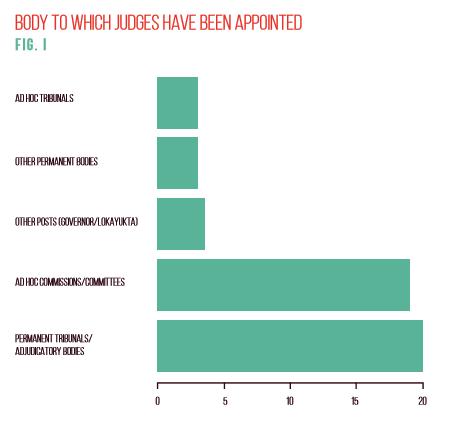
70 out of the 100 Supreme Court judges, who retired as on 12 February 2016, took up post-retirement jobs with various permanent and ad hoc bodies and committees, with the greatest number taking up quasi-judicial posts, according to data collected by the Vidhi Centre for Legal Policy.
Mint had reported on the report on Saturday, after it was released by Vidhi on Friday.
20 out of the 70 retired judges took up permanent tribunal appointments or appointments with other permanent adjudicatory bodies, while the next highest number were appointed with ad hoc commissions and committees. More than 30 judges were appointed within one year of their retirement, with around seven appointed even before they retired.
Motivations and other reasons
When the Chief Justice of India (CJI) retires his income plummets down from Rs 1 lakh per month, exclusive of allowances, to a pension of 50 per cent or lesser of his basic wage. For a Supreme Court judge the plummet is from a salary of Rs 90,000 per month.
“This indicates that pensions and post-retirement perquisites of a judge are clearly insufficient to maintain a semblance of the standard of living a judge previously enjoyed. When this is coupled with the fact that life expectancy in India has increased, while the retirement age of Supreme Court judges remains stagnant, the increasing willingness of judges to work post-retirement is obvious,” states the report.
Also, 56 per cent of these post-retirement appointments were backed by a requirement for them in law, and 36 per cent of the appointments were made exclusively by the central or state governments.
The late Chief Justice of India (CJI) SH Kapadia was one of the most high-profile Supreme Court judges in recent years to expressly decline a retirement job, having instead worked in Mumbai chambers until he passed away on 4 January 2016.
threads most popular
thread most upvoted
comment newest
first oldest
first
It is impossible that 100 Supreme Court judges have retired since Feb 2016. If you want to say 70%, please say so but this is misleading and downright incorrect.
Thank you for your comment.
It should have read as "70 of the 100 most recent retired judges AS ON 12 February..." instead of "since 12 February...". We have made the correction now.
Best wishes,
Prachi
threads most popular
thread most upvoted
comment newest
first oldest
first